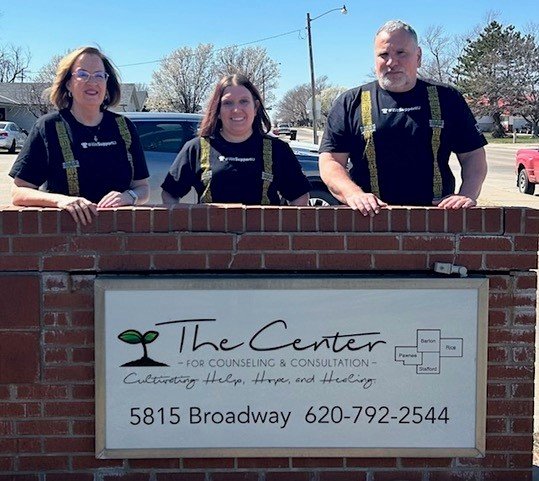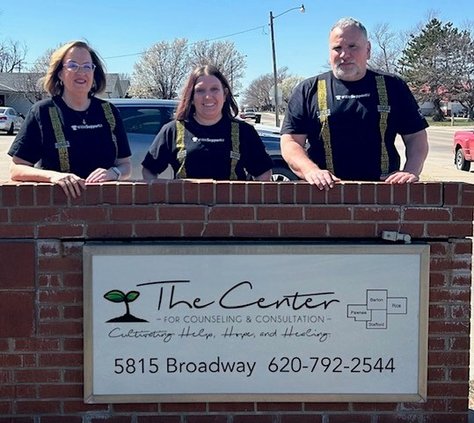Where to call
Save these phone numbers for suicide prevention:
The Center: 620-792-2544
Dropping 22: 620-786-0687
Suicide Prevention Lifeline: 988 or 1-800-273-TALK (8255)
Veterans Crisis Line: Dial the Lifeline number above and press 1.
The Trevor Project (LGBT): 866-488-7386
Crisis Text Line: Text “Hello” to 741-741
When Julie Kramp and Jeff McQuade tried to sum up their recent suicide-prevention training, they had a difficult time narrowing it all down.
Kramp is the executive director at The Center for Counseling & Consultation, 5815 Broadway. McQuade is The Center’s Care Coordination veterans’ specialist.
The training is called Suspenders4Hope, a program developed by Wichita State University. (See sidebar story at the bottom of this page.)
“There was so much valuable information offered, making it difficult to summarize,” Kramp said. “However, the session on ‘protective factors’ stands out.”
These factors include access to effective care; connections with other people; coping skills; positive self-esteem; and religious, cultural or personal beliefs that discourage suicide.
“Highlights included the importance of access to mental-health services and staying connected in your community,” Kramp said. “Also, positive self-esteem is crucial because low self-esteem can lead to suicidal thoughts.
“Anytime you need help with these and other issues, effective treatments are available locally, across Kansas and nationwide. Our struggles are not as overwhelming when we have support.”
Kramp noted that if someone doesn’t want to talk with a therapist in their own community, the national 988 suicide-prevention number is always an option.
“Those who answer 988 calls are trained and equipped to connect you with the best resources for your circumstances,” Kramp explained. “If it is a crisis, 988 can oftentimes de-escalate the problem. But if not, they will suggest resources that are geographically close to you.”
McQuade pointed out the “quick reminders” discussed during the training were especially helpful.
“The first reminder is you are not responsible for solving someone else’s problem or saving them,” McQuade said. “Your role as a friend or family member is to be present, listen and show support.
“Second, trust your gut. If you think someone needs to talk, ask about it. Even if you’re mistaken, they will appreciate the care you have shown.”
Another reminder he mentioned is not to dwell on hindsight “if you lost someone to suicide. We can’t judge ourselves later on. We do the best we can with the information we had at the time.”
McQuade also was impressed with the opportunity to collaborate with others at the training, while combining efforts to prevent a duplication of services.
“Each entity has its own strengths and we can capitalize on this,” McQuade commented. “An overall goal is to treat a problem before it escalates to a crisis. But if it does, there are resources available quickly.
“This training applies to home, church, the workplace and school – anywhere. We all need skills to be resilient, and find meaning and purpose in life. Sometimes all we need is someone to care about us.”
Dropping 22
Melissa Ewing, mental-health program provider and board president of Dropping 22, also attended the specialized training at Barton Community College.
Dropping 22, located at 916 Williams St. in Great Bend, is a non-profit organization dedicated to reducing the risk of suicide and improving mental health for veterans, first responders, the military community and their families.
“Suspenders4Hope pairs community awareness and action to make a difference in the number of suicides. It was a great way to pair our community with that awareness and action.
“The training was presented in a way that will help others ask hard questions and share concerns about suicide. This is not easy or comfortable. Nevertheless, the training will help others prepare to have these conversations.”
Ewing also noted that she was especially pleased to learn about resources that she hadn’t been aware of earlier.
Her plan is to provide Suspenders4Hope training to Dropping 22 board members and the populations they serve.
“We want to help educate others about the warning signs and what to do about them,” she explained. “I am very thankful to Suspenders4Hope for offering this training locally.”
The Center for Counseling & Consultation is a Community Mental Health Center serving Barton, Pawnee, Rice and Stafford counties. Professionally trained personnel offer: individual and group therapy; marriage and family counseling; community-support services; community-based services; psychosocial rehabilitation; peer support; and medication management. The confidential 24/7 crisis hotline number is 800-875-2544.
Suspenders4Hope training focused on prevention
Developed by Wichita State University (WSU), Suspenders4Hope is a comprehensive approach to promoting mental-health awareness, and preventing suicide, substance use and sexual violence.
The local training session focused on suicide prevention.
“Now that we have taken this facilitator training, we can provide it to our staff and other groups,” said Holly Bowyer, #ZeroReasonsWhy coordinator at The Center for Counseling & Consultation. “We want to spread the word as much as we can to prevent suicide and promote mental health.”
Bowyer also chairs the local Suicide Prevention Task Force under the Central Kansas Partnership umbrella.
The recent presentation resulted from a partnership between WSU, Barton, The Center, Dropping 22, Community Action of Wellness & Suicide Prevention and the Veterans Administration.
The training’s name, Suspenders4Hope, came from a WSU psychologist who wore a bow tie and suspenders in his make-believe role as a game-show host to help familiarize students with mental-health services.
The suspenders illustrated that students could support one another.




